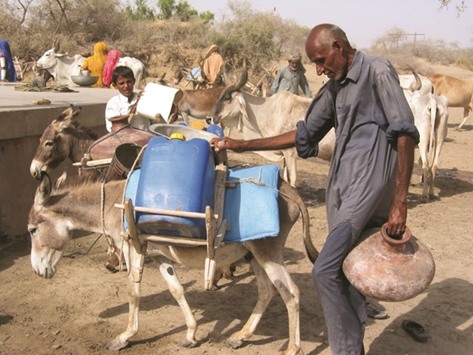
According to a report by the Sindh branch of the National Disaster Management Authority 259,946 families have been affected by the drought.
A non-profit group has requested a legal probe into a wave of children’s deaths in southern Pakistan, saying authorities should do more to protect residents from a long-running drought.
“More than 100 children have died since the start of January” in Sindh province, said Shuja Qureshi of Karachi-based Pakistan Institute of Labour Education and Research (PILER). “And we do not see any plan to tackle this issue.”
“We sent an urgent application to the Sindh High Court on January 22 to resume hearing our petition of 2014 for a probe to know the reasons for the deaths,” he said.
Children are apparently dying from malnutrition and lack of medical services in the province’s desert district of Tharparkar.
In 2014, the district saw 250 children’s deaths linked to the problems, he said.
A court order that year to determine the extent and causes of the problem was resisted by the provincial arm of the government of the Pakistan People’s Party (PPP) of former president Asif Ali Zardari.
Officials this year defended the authorities’ more recent response, and said the death count was being inflated and played for political gain by critics.
“Media is giving exaggerated figures,” said Allah Joria, superintendent of the district administrator office in Tharparkar. “I think they also include deaths of [older] boys and elderly people.”
“So far only 40 (infant) deaths have been reported since the start of January,” Joria said.
The figures at the heart of the debate are unclear.
Pakistan’s infant mortality rate is among the highest in the world. The average nationwide rates, as estimated by the World Bank, would account for around 200 deaths per month of children under one year old in Tharkparkar, whose population is estimated at 1.5mn.
But families who lost children agree with activists in Tharparkar that the problem is bigger than official counts show, and that authorities are failing to tackle the problem.
“I lost my four-month-old son, Dil Shad, two weeks ago,” resident Yousaf Jarar said. “I know many people who have buried their kids in the past weeks.”
Jarar’s son was brought to a hospital with pneumonia but died on the same day due to “weakness,” according to the official record, he said.
Regular drought since 2011 has killed off livestock and affected crops, said Ali Akbar, chief of local health organisation AWARE.
“The drought has added to malnutrition. Newborns are often weak and vulnerable to diseases,” he said.
“Last year there was rain but it was not enough and it also came late,” he added.
Sono Khangharani, a local health activist, said “poverty and lack of proper food” is at the heart of the problem, and has been compounded by an inadequate government response.
“The government is not ready to accept the problem of deaths or malnutrition,” he said.
“There is also the issue of corruption, as medicines meant for poor people are stolen by officials who sell them to private clinics.”
Poor infrastructure and remoteness - Tharparkar covers around 22,000 sq km - could be another reason for the deaths, according to Amar Gurior, a local freelance journalist.
But the government said the issue of infant mortality is a conspiracy to destabilise it.
Joria rejected allegations that authorities were responding slowly or that aid was inadequate.
“We do not have shortages of anything. We have enough grains for people and enough medicine to deal with patients,” he said.
According to a report by the Sindh branch of the National Disaster Management Authority, from March 2104 to March 2015 the government provided 752,228 bags of wheat flour to stricken families.
It also provided blankets, food, mosquito nets and other emergency materials. It said 259,946 families were affected by the drought.
“In addition to hospitals, the mobile health teams are working in the district to provide medical services,” Joria said.
But such claims are little consolation to those who have lost children.
“The situation is not good. None of the officials came to me with offers of help when my son was sick and even after the death nobody came to offer financial or material support,” Jarar said.
